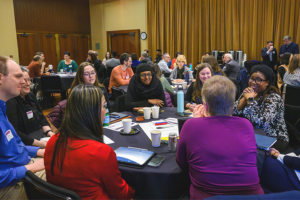League Of American Orchestras Launches Three Year Inclusive Stages Program
The program will focus on increasing the number of Coalition members to include youth orchestras, educational institutions, pathways programs, and more.
 The League of American Orchestras’ pioneering Inclusive Stages program will launch into a full three year cycle, following a successful pilot year in 2023-24. Made possible by the Sakana Foundation, the program is aimed at increasing racial diversity among musicians in American orchestras.
The League of American Orchestras’ pioneering Inclusive Stages program will launch into a full three year cycle, following a successful pilot year in 2023-24. Made possible by the Sakana Foundation, the program is aimed at increasing racial diversity among musicians in American orchestras.
“After just one year of the Inclusive Stages program, we’re already seeing orchestras across the country taking concrete action toward making our stages more diverse,” said League of American Orchestras President and CEO Simon Woods, “It’s thrilling to see orchestra managements, musicians, conductors, and unions working collectively to make use of learning they developed through the pilot year of this program and other League resources to improve organizational culture and create more equitable tenure and audition practices. We’re deeply grateful to the Sakana Foundation for their vision in supporting this important work and enabling us to expand the scope of the program to serve the orchestra field.”
The Inclusive Stages pilot year included the building of a national Coalition, a series of data collection opportunities, and the creation of actionable insights for orchestras. A variety of metrics confirm the success of the pilot, from numbers of participants and quality of participation to actions already taken by Coalition orchestras. The program saw 11 music directors actively participating alongside senior staff, staff members, and other stakeholders.
Pilot Year Highlights:
Historic National Coalition: 28 orchestras representing the full range of budget sizes and geographic regions joined the Coalition in 2023. Over 100 individuals attended each of two virtual convenings, with 65 participating in-person in Detroit in early 2024 as well as an Inclusive Stages session at the League’s National Conference in Houston attended by Coalition members and Conference delegates.
Throughout the pilot year, each orchestra set goals, benchmarks, action steps, and timelines for their work. Since the Detroit convening, at least two members of the Coalition, the Charlotte Symphony Orchestra and Detroit Symphony Orchestra, have already publicly announced contractual updates to audition and tenure processes for greater inclusivity, and others are expected to follow.
Improving Organizational Culture: 60 orchestras participated in the Inclusion Index survey, produced in collaboration with Accordant Advisors, collecting 1,936 responses from musicians and 833 responses from staff members. The participating orchestras received individualized feedback on their staff’s wellbeing and feelings of belonging. Initial feedback shows improved communication across organizations’ stakeholders as a result of these reports.
Senior-Level Engagement, Including 11 Music Directors:
Senior staff, including orchestra CEOs, board chairs, and music directors, were personally engaged throughout the year, actively participating in Inclusive Stages work alongside staff members and other stakeholders.
Participants shared challenges and successes, engaged in roundtable discussions, and visualized positive disruption
Participants shared challenges and successes, engaged in roundtable discussions, and visualized positive disruption. Pictured: participants chatting after a session. Photo: Doug Coombe
Collaboration and Problem-Solving: Orchestra management, musicians, conductors, musician unions, and partner organizations worked collectively within the Coalition, confronting challenges, devising potential solutions, developing new relationships, and providing valuable input to the League.
Establishing Baseline Data:
In addition to the Inclusion Index, orchestras had the opportunity to participate in the League’s ongoing Orchestra Demographics Survey as well as the Audition Applicant Demographics Survey. Coalition members worked closely with the League, helping to create the pilot Audition and Tenure Practices Survey.
The Next Three Years:
Goals: Goals for the next three years of Inclusive Stages include, among others, expanding the number of Coalition members; helping orchestras establish best practices and processes for recruitment; establishing systemized trainings for the field; providing data-driven insights; and publishing three new Catalyst Guides, all with the understanding that the Coalition orchestras will make measurable progress within three years.
Expanding the Coalition: Youth orchestras are now invited to join the Coalition, a recognition of the critical importance work with young people plays in improving the diversity of American orchestras. Additional professional and community orchestras will be added, and the number of partner organizations will be expanded to include more conservatories and colleges, pathways programs, organizations focused on equity, and local unions. The League will prioritize growing the number of BIPOC musicians involved in the program, including those participating in the Coalition, those serving as speakers at learning events, and those providing input and feedback on research projects.
In addition to full-Coalition in-person and virtual meetings, regional in-person meetings and smaller topic-based working groups will also be established, as recommended by pilot year participants.
An interactive visualization during the Inclusive Stages convening at the League’s National Conference in Houston
An interactive visualization during the Inclusive Stages convening at the League’s National Conference in Houston. Photo: Melissa Taylor
New Resources and Training:
The League plans to launch an online discussion platform and training modules and resources for staff and musicians, to be made available to the full field at a later date. There are also plans for webinars and publications throughout the next three years, including a series of three Catalyst Guides focused on topics which are central to the work of Inclusive Stages.
Expanded Data Initiatives: The continuation of the Orchestra Demographics Survey and Audition Applicant Demographics Survey will benefit the field by tracking progress over time. The Audition and Tenure Practices Survey will expand to include the entire field. A follow-up short Pulse survey to Inclusion Index survey participants will examine improvements to organizational culture made as a result of last year’s initial Inclusion Index survey with Accordant Advisors. The Pulse survey will also be offered to additional orchestras that did not participate initially.
Comments

Videos
